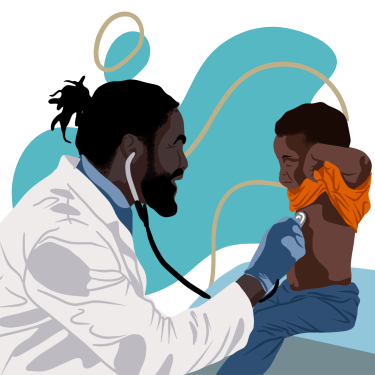
Demand 03
Health
Nigeria is in a state of poor health systems and services coupled with a lack of flow of financial revenue to remediate urgent issues affecting health systems whether at a local or national level.
Health infrastructures such as hospitals, research centres, and health practitioners lack resources, innovation and the readiness to respond to the rapid environmental and social threats prompted by the climate crises through disasters like flooding, drought, heat waves and so on.¹²
With a massive brain drain in the healthcare workforce and the Covid-19 pandemic, service delivery and expertise in our public healthcare system are at an all-time low.¹³ More worrisome are the health and environmental impacts of the extractive industries that pose tremendous and almost irrecoverable impacts on the Youth and Communities. To achieve the health-related Sustainable Development Goals (SDGs), governments at all levels must expand their health budgets to effectively cater to the welfare of healthcare personnel and provide functional healthcare facilities that incorporate efficient decentralised and renewable energy solutions.
Call to Action
Reduce health-related carbon footprint by increasing the capacity to manufacture essential drugs, vaccines and
consumables locally by pooling funds for such measures and investing in local ideas by designing a framework to
support innovative thinking.
Revive, prioritise and resource primary healthcare services through rapid scale-up and investments, and conduct
capacity building on integrating climate change into the health sector for health sector agencies.
Build and strengthen health services and its systemic infrastructure to become an entity where health issues are
effectively addressed with urgency and efficiency.
Promote low-carbon procurement policies for pharmaceuticals and medical equipment to advance energy access and technology use in the health sector, and provide clean and reliable water sources and green energy for healthcare centres.
Constitute health vanguards that would champion health, safety and environmental consciousness to advance disaster risk reduction against outbreaks and pandemics including climate change-related diseases.
Prioritise conducting Environmental Impact Assessments before administering extractive licences and permits for artisanal mining, and ensure effective monitoring of extraction activities to comply with the necessary extractive and environmental regulations.
A national medical emergency response plan should be developed and decentralised to states and local governments in Nigeria.
Initiate public-private partnerships agreement to provide healthcare infrastructures and services, as well as investments to improve the working conditions, boost training and deployment and retention of health workers in public healthcare systems.
Follow through with the African Union’s commitment to allocate a 15% annual budget to the health sector and the WHO’s threshold density of 4.45 health workers per 1000 people to deliver essential health services and achieveuniversal health coverage.
Ensure timely and complete disbursement of funds such as the Basic Healthcare Provision Fund for health services such as immunisation, health security, essential drugs, ambulance services and healthcare workforce salaries and gratuity.
References
[12] https://ng.boell.org/sites/default/files/solar_for_phcs.pdf
[13] https://equityhealthj.biomedcentral.com/articles/10.1186/s12939-022-01789-z